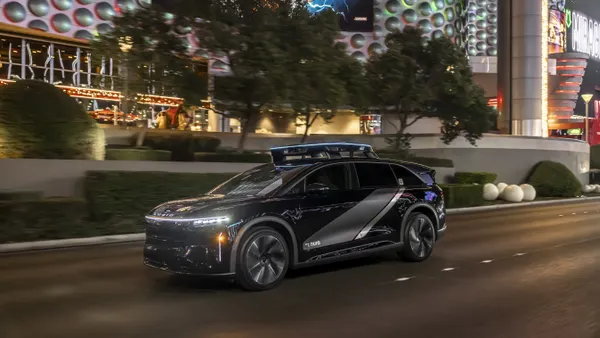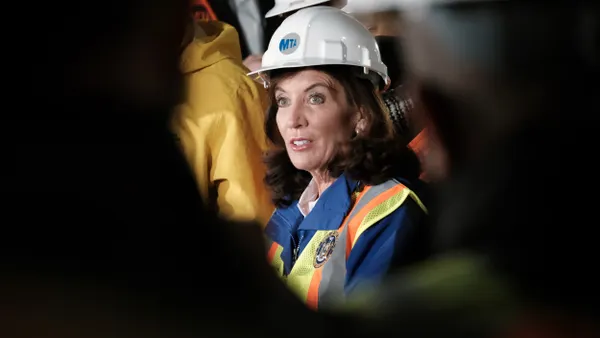Uber CEO Dara Khosrowshahi said the slew of new collaborations it announced yesterday shows the company wants to be a partner with cities where it operates, as well as "solve the problem of car ownership."
The ride-hailing app company launched four new initiatives at an event in Washington, DC, and also discussed its acquisition of dockless electric bike-sharing company Jump, announced earlier this week. In addition to that purchase, Uber will partner with software company Masabi on providing public transportation information in cities; with Getaround on a new car-sharing service; and with nonprofit SharedStreets on providing cities with data on curbside activity. Uber will also expand its Uber Movement tool that tracks and aggregate data on travel conditions to another 12 cities on five continents.
In a speech, Khosrowshahi said the initiatives are designed so that Uber moves beyond just being a car service and provides city residents with options on a variety of modes of transportation. "As we think about a solution for urban mobility for cities, we have to have a solution for car ownership and we have to work together to make sure that living in a city or living in an urban destination doesn't require you to own a car," he said.
The partnership with Getaround will be dubbed "Uber Rent," and will be piloted in San Francisco before a wider roll-out. Users can rent out their cars and rent other people’s through the peer-to-peer software that will integrate onto the Uber app, with renters charged by the hour or for a whole day.
Jahan Khanna, Head of Product for Mobility at Uber, said it is perfect for city dwellers who want to make small trips like to the grocery store or to pick up relatives. "All these cases may seem exceptional, but all these cases are what keep people buying a car, because in the back of their mind that's the only way they feel comfortable living in a city," he said.
The partnership with Jump will mean riders can find and unlock an e-bike through the Uber app. Jump CEO Ryan Rzepecki said the collaboration, known as Uber Bike, will help Jump "be part of a multi-global platform that includes car-share, public transit, biking and shared rides."
Khanna said a partnership with Masabi is in the early stages of development, but will eventually lead to Uber app users being able to track routes and schedules for public transportation in cities, as well as paying fares through the app. Masabi already partners with 35 of the world’s biggest transit agencies, and Khanna said he hopes the pact "represents the beginning of us growing into something much more ambitious as a company."
On curbside planning, Uber promised a public-private partnership (P3) between itself, SharedStreets and local governments to provide data on pick-ups, drop-offs and choke points on the street. The program will be piloted in DC alongside the District Department of Transportation and the Department of For-Hire Vehicles. Officials will be provided with a dashboard of aggregated, anonymous data that tracks taxis as well as hailed rides, all to try and work out how to plan for lower congestion at the curbside. Meghan Joyce, Uber’s Regional General Manager for the United States and Canada, said it will help cities "better do curbside planning and ensure everyone who needs to use the curbside is doing so in a safe, responsible and easy way."
And Uber Movement will expand into 12 cities — Amsterdam, Bangalore, Brisbane, Cairo, Hyderabad, Melbourne, Mumbai, Nairobi, New Delhi, Perth, Pittsburgh and Toronto — bringing that program’s total up to 21. Joyce said the company was excited to “help even more urban planners tackle the increasing challenges that they're seeing every day through this system.”
Joyce and Khosrowshahi agreed that for Uber to continue to grow, it will need to be an active partner with cities. Khosroshahi said they "want Uber to partner with cities to be part of our solution going forward."
"We know that there's more we can do for the cities in which we operate,” Joyce added. "And in order to do that, we need to give back to the cities and public agencies that govern the communities in which we operate."










